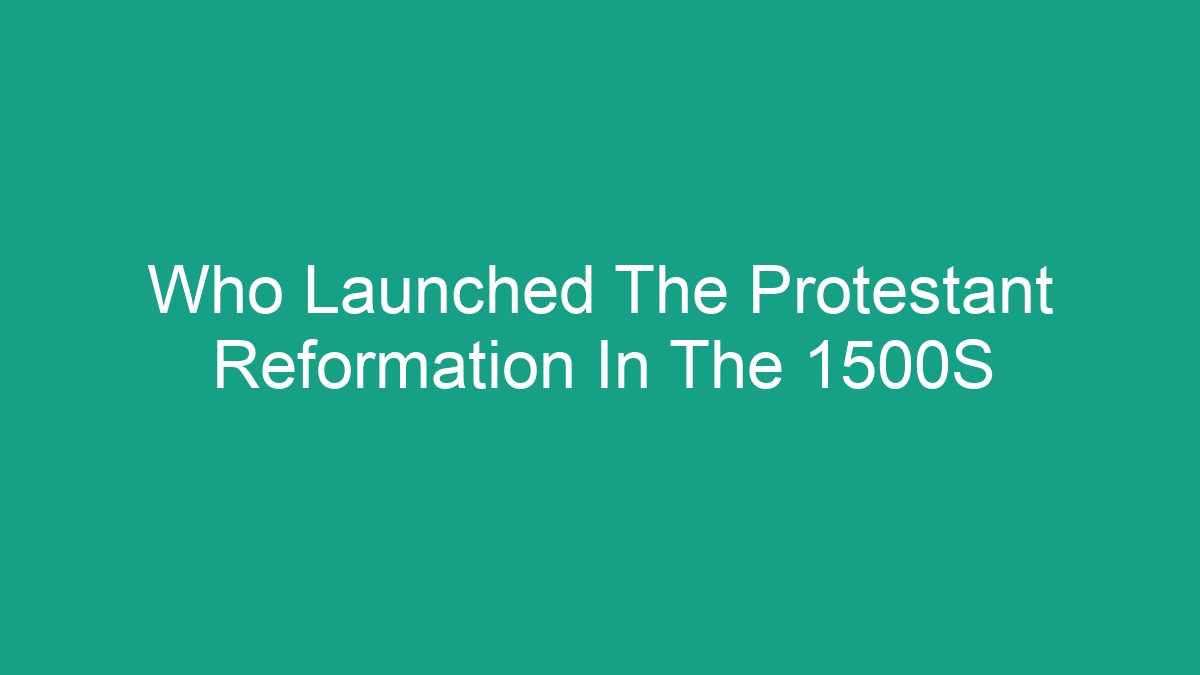
The Protestant Reformation in the 16th century was a significant movement that challenged the authority of the Catholic Church and led to the establishment of Protestantism. The Reformation was initiated by several key figures who played pivotal roles in shaping the religious landscape of Europe. In this article, we will explore the individuals who launched the Protestant Reformation in the 1500s and their contributions to this transformative period in history.
Martin Luther
Martin Luther is perhaps the most well-known figure associated with the Protestant Reformation. He was a German monk and theologian who is credited with sparking the movement by nailing his Ninety-Five Theses to the door of the Castle Church in Wittenberg on October 31, 1517. This act was a direct challenge to the Catholic Church’s practice of selling indulgences, which were certificates that supposedly granted remission of sins.
- Luther’s Ninety-Five Theses spread rapidly due to the recent invention of the printing press, and his ideas gained popular support across Europe.
- He believed in the concept of “justification by faith alone,” which emphasized the idea that individuals are saved through their faith in God rather than through good works or indulgences.
Luther’s refusal to recant his beliefs at the Diet of Worms in 1521 further solidified his role as a central figure in the Reformation. His translation of the Bible into German also made the scriptures accessible to the common people, contributing to the spread of Protestant ideas.
John Calvin
Another influential figure in the Protestant Reformation was John Calvin, a French theologian and pastor who played a key role in the development of Reformed theology. Calvin’s teachings emphasized predestination, the idea that God has already determined who will be saved and who will be damned.
- His most famous work, “Institutes of the Christian Religion,” provided a systematic presentation of Protestant theology and became a foundational text for the Reformed tradition.
- Calvin’s leadership in Geneva established a theocratic government and a model of Christian community that influenced Reformed churches across Europe.
Calvin’s emphasis on the sovereignty of God and the authority of scripture had a lasting impact on the development of Protestant thought and theology.
Ulrich Zwingli
- Ulrich Zwingli, a Swiss pastor and theologian, was another important figure in the early Protestant Reformation.
- He was known for his role in the Reformation in Switzerland, where he advocated for the abolition of the Mass and the authority of the Bible in shaping Christian life and doctrine.
Zwingli’s teachings laid the foundation for the development of the Reformed tradition in Switzerland and were influential in shaping the theology and practices of Protestant churches.
King Henry VIII
In England, the Protestant Reformation was closely tied to the political ambitions of King Henry VIII. Henry’s desire to annul his marriage to Catherine of Aragon, who had not produced a male heir, led to a break from the Catholic Church and the establishment of the Church of England.
- While Henry’s motives were largely rooted in personal and political concerns, his actions had a profound impact on the religious landscape of England.
- The English Reformation led to the dissolution of monasteries, the creation of the Church of England, and the emergence of Protestant theology within the country.
Henry’s actions set the stage for the ongoing religious changes that unfolded in England during the 16th century.
Other Reformers
The Protestant Reformation was a multifaceted movement that involved numerous other reformers who contributed to its development and spread. Figures such as Philip Melanchthon, John Knox, and William Tyndale each played important roles in shaping Protestant thought and establishing new forms of Christian worship and community.
- Melanchthon, a close associate of Luther, was instrumental in shaping the theological direction of the Lutheran tradition.
- Knox, a Scottish pastor, was a key figure in the development of Presbyterianism and the Reformation in Scotland.
- Tyndale, an English scholar, is known for his translation of the Bible into English, which had a profound impact on the development of the English Reformation.
These and other reformers each contributed in their own way to the diverse and dynamic character of the Protestant Reformation.
FAQs
Q: What were the main theological issues that led to the Protestant Reformation?
A: The main theological issues that led to the Protestant Reformation included the authority of the Catholic Church, the sale of indulgences, the role of good works in salvation, and the interpretation of scripture.
Q: How did the Protestant Reformation impact the religious and political landscape of Europe?
A: The Protestant Reformation led to the division of Western Christianity into Catholicism and various forms of Protestantism. It also had significant political ramifications, as rulers and governments aligned themselves with different religious traditions.
Q: What were the lasting effects of the Protestant Reformation?
A: The Protestant Reformation had a lasting impact on the development of European religious and cultural history. It led to the emergence of new religious traditions, such as Lutheranism, Calvinism, and Anglicanism, and contributed to the rise of individualism and the spread of literacy.
In conclusion, the Protestant Reformation in the 1500s was launched by a diverse group of individuals who each played a crucial role in challenging the authority of the Catholic Church and establishing new forms of Christian practice and belief. Their contributions continue to shape the religious landscape of the world today.


